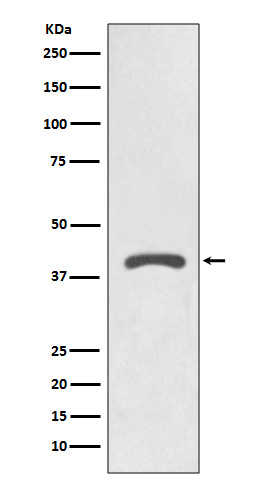Anti-AGTR2/Angiotensin Ii Type 2 Receptor Rabbit Monoclonal Antibody
- SPECIFICATION
- CITATIONS
- PROTOCOLS
- BACKGROUND

Application
| WB, IP |
|---|---|
| Primary Accession | P50052 |
| Host | Rabbit |
| Isotype | Rabbit IgG |
| Reactivity | Rat, Human, Mouse |
| Clonality | Monoclonal |
| Format | Liquid |
| Description | Anti-AGTR2/Angiotensin Ii Type 2 Receptor Rabbit Monoclonal Antibody . Tested in WB, IP applications. This antibody reacts with Human, Mouse, Rat. |
| Gene ID | 186 |
|---|---|
| Other Names | Type-2 angiotensin II receptor, Angiotensin II type-2 receptor, AT2 receptor, AGTR2 {ECO:0000303|PubMed:7790004, ECO:0000312|HGNC:HGNC:338} |
| Calculated MW | 41184 MW KDa |
| Application Details | WB 1:1000-1:2000 IP 1:50 |
| Subcellular Localization | Cell membrane; Multi-pass membrane protein. |
| Tissue Specificity | In adult, highly expressed in myometrium with lower levels in adrenal gland and fallopian tube. Expressed in the cerebellum. Very highly expressed in fetal kidney and intestine.. |
| Contents | Rabbit IgG in phosphate buffered saline, pH 7.4, 150mM NaCl, 0.02% sodium azide and 50% glycerol, 0.4-0.5mg/ml BSA. |
| Clone Names | Clone: FIO-1 |
| Immunogen | A synthesized peptide derived from human AGTR2 |
| Purification | Affinity-chromatography |
| Storage | Store at -20°C for one year. For short term storage and frequent use, store at 4°C for up to one month. Avoid repeated freeze-thaw cycles. |
| Name | AGTR2 {ECO:0000303|PubMed:7790004, ECO:0000312|HGNC:HGNC:338} |
|---|---|
| Function | Receptor for angiotensin II, a vasoconstricting peptide (PubMed:28379944, PubMed:29967536, PubMed:31899086, PubMed:8185599). Signals primarily via a non-canonical G-protein- and beta-arrestin independent pathways (PubMed:28379944). Cooperates with MTUS1 to inhibit ERK2 activation and cell proliferation (PubMed:15123706). |
| Cellular Location | Cell membrane {ECO:0000250|UniProtKB:P35374}; Multi-pass membrane protein |
| Tissue Location | In adult, highly expressed in myometrium with lower levels in adrenal gland and fallopian tube. Expressed in the cerebellum. Very highly expressed in fetal kidney and intestine |

Thousands of laboratories across the world have published research that depended on the performance of antibodies from Abcepta to advance their research. Check out links to articles that cite our products in major peer-reviewed journals, organized by research category.
info@abcepta.com, and receive a free "I Love Antibodies" mug.
Provided below are standard protocols that you may find useful for product applications.
If you have used an Abcepta product and would like to share how it has performed, please click on the "Submit Review" button and provide the requested information. Our staff will examine and post your review and contact you if needed.
If you have any additional inquiries please email technical services at tech@abcepta.com.













 Foundational characteristics of cancer include proliferation, angiogenesis, migration, evasion of apoptosis, and cellular immortality. Find key markers for these cellular processes and antibodies to detect them.
Foundational characteristics of cancer include proliferation, angiogenesis, migration, evasion of apoptosis, and cellular immortality. Find key markers for these cellular processes and antibodies to detect them. The SUMOplot™ Analysis Program predicts and scores sumoylation sites in your protein. SUMOylation is a post-translational modification involved in various cellular processes, such as nuclear-cytosolic transport, transcriptional regulation, apoptosis, protein stability, response to stress, and progression through the cell cycle.
The SUMOplot™ Analysis Program predicts and scores sumoylation sites in your protein. SUMOylation is a post-translational modification involved in various cellular processes, such as nuclear-cytosolic transport, transcriptional regulation, apoptosis, protein stability, response to stress, and progression through the cell cycle. The Autophagy Receptor Motif Plotter predicts and scores autophagy receptor binding sites in your protein. Identifying proteins connected to this pathway is critical to understanding the role of autophagy in physiological as well as pathological processes such as development, differentiation, neurodegenerative diseases, stress, infection, and cancer.
The Autophagy Receptor Motif Plotter predicts and scores autophagy receptor binding sites in your protein. Identifying proteins connected to this pathway is critical to understanding the role of autophagy in physiological as well as pathological processes such as development, differentiation, neurodegenerative diseases, stress, infection, and cancer.


